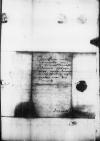Letter #675
Ioannes CAMPENSIS (Jan van CAMPEN) to Ioannes DANTISCUS[Leuven (Lovanium)?], 1531-08-27
Manuscript sources:
Prints:
| ||||||||||
Text & apparatus & commentaryPlain textText & commentaryText & apparatus
Clarissimo multis nominibus viro, domino
Salutem.
Dum rem bene perpendo, nescio, an velim irasci magis domino
Quare si tu, Domine mi, contentus esse posses illis, quos habes, ego reliquos soli mihi servarem subinde obiter recognoscendos. Rescribe quaeso, si molestum non erit, tuam sententiam.
Ab eo tempore, quo tuum huc misisti ministrum, non admodum recte valui; corripuit enim me puerilis prope modum morbus, propter quem tamen a prandio numquam vel cena abstinui.
Vale, Domine mi. Fortasse brevi adhuc semel invisam te, redii enim ad me prope modum. Iterum vale.
27 Augusti 1531.
Tuus, quem nosti,


 AAWO, AB, D. 3, f. 51v
AAWO, AB, D. 3, f. 51v